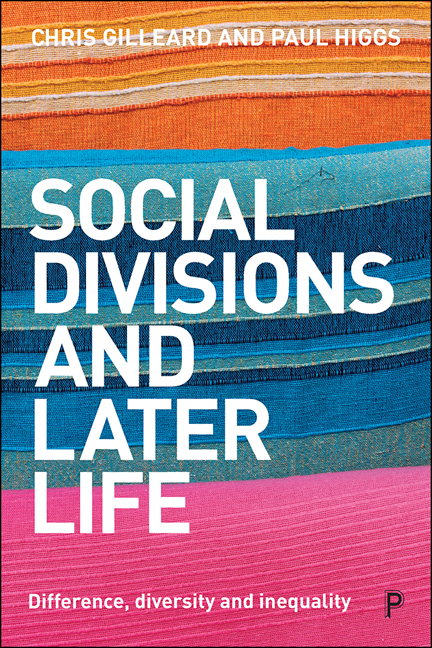Book contents
- Frontmatter
- Contents
- List of Figures and Tables
- Preface
- 1 Social Divisions and Social Differences
- 2 Social Class and Inequality in Later Life
- 3 Ageing and Gender
- 4 Ethnicity, Race and Migration in Later Life
- 5 Disability and Later Life
- 6 Identity and Intersectionality
- 7 Diversity, Difference and Division in Later Life
- References
- Index
2 - Social Class and Inequality in Later Life
Published online by Cambridge University Press: 25 February 2021
- Frontmatter
- Contents
- List of Figures and Tables
- Preface
- 1 Social Divisions and Social Differences
- 2 Social Class and Inequality in Later Life
- 3 Ageing and Gender
- 4 Ethnicity, Race and Migration in Later Life
- 5 Disability and Later Life
- 6 Identity and Intersectionality
- 7 Diversity, Difference and Division in Later Life
- References
- Index
Summary
Social class and its related inequalities have been a mainstay of research in the social sciences. Research into class-related inequalities has existed alongside, but has often not been connected with, the concerns of class theory. Despite both approaches seeming to depend upon one another in order to give substance to their claims of social significance, a strange lack of engagement continues to exist between the two traditions (Scambler and Higgs, 1999). In contrast to the limited work on social class theory, social class-related inequalities have been extensively researched, particularly in relation to health, where the connection between class, health and mortality has been well established (Antonovsky, 1967; Bartley, 2004). Even though this research has been criticised for its lack of theoretical justification and categorical imprecision (Cartwright and O’Brien, 1974), it continues to bask in the glow of its underpinning the analysis of the ‘Black Report’ (Whitehead 1992), establishing what the UK Conservative government came to term ‘health variations’. Its influence has continued, with regular assessments of its impact (MacIntyre, 1997), as well as acknowledgement of its role in creating the burgeoning field of health inequalities research (Bouchard et al, 2015).
While the field of inequalities has eschewed highly theorised concepts of class, ideas of social gradients or status abound (Marmot, 2006) along with the assumed psycho-social pathways to ill health created by such gradients (Wilkinson and Pickett, 2010). In the UK, policy recommendations such as those contained in the Acheson Report and the Marmot Review have focused on strategies to overcome inequalities even if this has been described as ‘a labour of Sisyphus’ (Bambra et al, 2011). The lack of a clear understanding of the structuring of social class links together the two strands of thinking about inequality in all its disparate forms (Goldthorpe, 2010; Scambler and Scambler 2015; Wemrell et al, 2016). Those concerned with these issues are confronted with the fact that while the nature of social class analysis has long been a central issue in the study of society and its social divisions, class remains, in the words of one contemporary analyst, ‘a slippery concept’ employed through a wide range of potentially disparate indices (Bottero, 2015: 15).
- Type
- Chapter
- Information
- Social Divisions and Later LifeDifference, Diversity and Inequality, pp. 19 - 40Publisher: Bristol University PressPrint publication year: 2020



